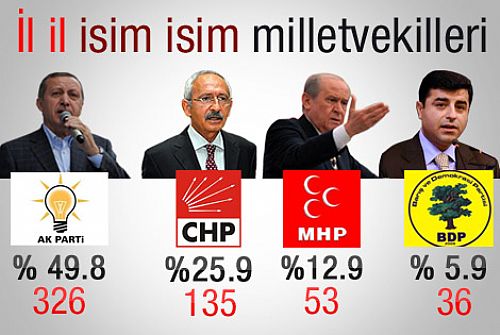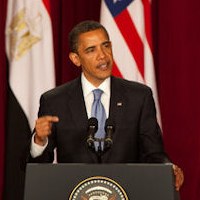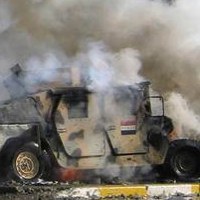![]()
Mon, June 27, 2011 | Turkey Analyst, vol. 4 no. 13 | By Kardi Gürsel
Tough Times Ahead in Search of Turkey’s New Soul
This article was first published in the Turkey Analyst (www.turkeyanalyst.org), a biweekly publication of the Central Asia-Caucasus Institute & Silk Road Studies Program Joint Center. © Central Asia-Caucasus Institute & Silk Road Studies Program Joint Center, 2010.
Polarizing the society over religious and cultural identities has been the power tactic of the Justice and Development Party (AKP) almost all along. That tactic once again worked to the benefit of the AKP in the recent general election. But the daunting constitutional challenge that Turkey now faces requires an ability to reach across divides of identity. The new, difficult parliamentary arithmetic in a highly divided political terrain heralds tough times as the new Turkey searches for its soul.
Background
There were two indisputable victors of the June 12 parliamentary elections in Turkey: The first is obviously the Prime Minister Recep Tayyip Erdoğan’s Justice and Development Party (AKP), but the other is the pro-Kurdish Peace and Democracy Party (BDP).
The predominantly Kurdish candidates of the BDP had to run independently to by-pass the exceptionally high nation-wide electoral threshold of 10 ten percent and 36 of them were elected. Now the BDP is the fourth largest party represented in the 550 seat Turkish parliament, after the AKP, the Republican People’s Party (CHP) and the Nationalist Movement Party (MHP), which won 53 seats.
The AKP’s victory — 50 percent of the votes, resulting in 326 seats — is by any measure remarkable; one could have expected that a certain fatigue, after nine years in power, would have exacted its toll in the ballot box. On the contrary, however, for the third time in a row, the AKP succeeded in increasing its public support by three percentage points. The AKP had won respectively 34.6 percent in 2002 and 47 percent in 2007 in the two previous elections.
There are six major factors that effectively account for the AKP’s third consecutive victory. Five of them are directly linked to the effectiveness of the party and its policies. The sixth one is related to the electoral system.
To begin with, the AKP performed well in the management of Turkish economy and kept the growth rate relatively high; it notably succeeded in ascertaining that the negative effects of the global financial crisis were contained, ensuring that they were felt only during a remarkably short period. Secondly, the AKP government has raised the standards in the fields of health, education, transport, communication, infrastructure and housing to remarkable levels. The principal beneficiary of these major improvements has been its core electoral base, the religiously conservative Sunni masses, among whom those from lower income groups are strongly represented. The dividends of the continued economic growth have been used by the AKP in a quite efficient way.
The third factor that worked to the AKP’s benefit was obviously Recep Tayyip Erdoğan; the Prime Minister is without any doubt a major asset for his party. His leadership performance and the way he is able to connect with the electorate, earning its trust, by far outrivaled the performance of the other party leaders. Fourth, the AKP’s well-functioning, highly disciplined and highly performing party organization, which has not yet satisfied its appetite for power and wealth, is a formidable political machine geared to electoral success, and it made a huge difference.
The fifth factor is spelled divide and rule policy. Polarizing the society over religious and cultural identities has been the AKP’s power tactic almost all along. The logic is straightforward: the biggest slice of a divided Turkish society is always the Sunni conservatives, which are — as was once again demonstrated on June 12 — a large enough group, when it is mobilized, to keep the AKP in power. During the last electoral campaign, Prime Minister Erdoğan more than ever made excessive use of an abrasive, aggressive and communitarian rhetoric of “us and them”. Erdoğan referred to the Alevi origin of CHP leader Kemal Kılıçdaroğlu (who hails from the Kurdish Alevi region Dersim, which was renamed Tunceli after a rebellion there was put down in 1938) in public rallies. Erdoğan did not react when the crowds reacted to his words by booing the CHP leader. On the Kurdish question, Erdoğan stated that he would have hanged Abdullah Öcalan, the leader of the PKK, if his party had been in the governing coalition when he was captured in 1999. Before that blow, he is remembered for having said during the campaign that the Kurdish question doesn’t exist, but that there are only Kurds who have problems.
Implications
When the biggest slice goes to Erdoğan’s party, then the lesser slice goes to Kılıçdaroğlu’s CHP; the common denominator in terms of identity for the CHP voters is not being social-democrat, Alevi or ultra-nationalist Kemalist but it is being secularist. Hence, this ensures that the CHP remains the second party in Turkey but not big enough to rival the AKP in a two party game. This is the case because any party with a clear secular identity will lack in advance the potential of reaching a level of public support equal to the one that the AKP enjoys; thus the CHP is condemned to stay in opposition unless the AKP makes historic mistakes and then squanders public trust. So, polarizing Turkish society serves the best political interest of Erdoğan and his party.
The sixth and the last major reason to be underlined in explaining the success of the AKP is the 10 percent threshold to parliament. The threshold, which is a shame for any democracy, has never worked so mercilessly for the benefit of the biggest political party in any election so far as it did this year. All small parties, mostly the two Islamist parties, the Voice of the People Party and the Felicity Party, literally vanished. The small conservative leaning centre-right party, the Democratic Party, faced the same fate. Large majorities of their constituencies — which had reached a total of 8-9 percent in the last general election — apparently supported the AKP this time.
The 10 percent threshold has worked like a catalyst with the first five major factors underlined above and created an empty political space under itself. There is no political party now existing with a considerable popular base under the 10 percent-level, save for the Kurdish Peace and Democracy party (BDP). Turkish politics below 10 percent is now effectively empty. It is above anything else this stream from the small parties that accounts for the increase in the AKP’s votes. Above the 10 percent level, the votes were principally distributed according to the identity divide. Each one of the opposition parties in the parliament represents parts of the electorate that are clearly distinguished by their clashing identities. The BDP is for the Kurdish identity, the CHP stands for the secular identity and the MHP speaks for the Turkish nationalist identity. The AKP represents the sum of the leanings from Islamist to center-right that constitute the bulk of the huge conservative, Sunni majority.
For an unpredictable period of time, the dynamics of political pluralism in one half of the divide will remain frozen, under the will of this strong leader; the AKP is a strongly centralized political structure, strictly controlled by the strong leader, Erdoğan.
The only political force that has managed to circumvent this “serial small party killer” that the 10 percent threshold amounts to was the Kurdish movement. With a skillfully orchestrated constituency management, independent candidates of the Peace and Democracy Party managed to overcome the threshold. They placed themselves as the key counterparts of any kind of negotiation for constitutional change which will take place sooner or later in the parliament.
There will definitely be bargains and negotiations; because the number of seats obtained by the AKP falls short of the minimum three fifths majority (330 seats) which is required by the constitution to amend it unilaterally or to make a brand new one again by the same way. Drafting a new constitution was the centerpiece of the electoral campaign, and it will occupy the political agenda in the months ahead. The current constitution was commissioned by the generals who had staged the coup in 1980. The authoritarian soul of this constitution still remains to be expunged, even though it has been amended more than twenty times during the last decades.
And this authoritarian soul is in a constant clash with today’s Turkey. In the decades that have passed since 1982, Turkish society has evolved to a point of becoming pointedly more pluralistic and diversified. The narrow costume of the current constitution no longer fits this dynamic society on the move.
In fact, there is a growing, popular demand for a liberal and inclusive constitution. The demand comes mostly from Kurds, from Alevis (the heterodox Muslim community) and from the newly emerging middle class, as well as from intellectuals and the business elite. Adopting a new constitution in Turkey’s difficult political terrain will be a serious test and it will determine the future of what still remains a fragile democracy. The biggest challenge is the Kurdish question and it requires urgent action for a permanent peace.
In this context, the minimum parameter which needs to be established is an agreement on removing the references to Turkishness in the current constitution; that is necessary in order to clear the way for a perspective to solve the Kurdish problem in the future.
Conclusions
It is no secret that Prime Minister Erdoğan has set his sight on becoming the first popularly elected president of the republic. And during the election campaign, Erdoğan openly called for the introduction of a presidential system. But that now depends on securing the support of others in parliament, and the most likely candidate for such a bargain is the Kurdish movement. But in return for acquiescing, the Kurdish deputies can be expected to exact a maximum price, that is, a constitutional status for the Kurds and what is termed “democratic autonomy” for the Kurdish region.
The new, difficult parliamentary arithmetic in a highly divided political terrain heralds tough times as the new Turkey searches for its soul.
Kadri Gürsel is a columnist with the Milliyet newspaper.



 RSS
RSS











Tough Times Ahead in Search of Turkey’s New Soul | #Turkey #Kurds #BDP #AKP #CHP #Islamism http://bit.ly/jx06Rq
Tough Times Ahead in Search of Turkey's New Soul | Middle East …: You've to install Adobe Flash Player to see … http://bit.ly/lPHPtu
Tough Times Ahead in Search of Turkey’s New Soul | #Turkey #Kurds #BDP #AKP #CHP #Islamism http://bit.ly/jx06Rq